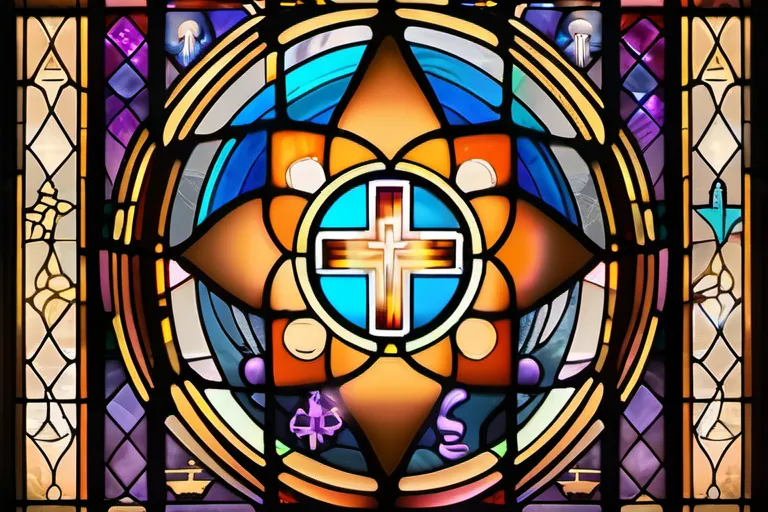Explore the role, significance, and impact of belief in God on religious thought across various religions.
This article delves into the profound influence that belief in God has on religious thought. We will examine how this belief shapes religious practices, doctrines, and communities across different faiths.
The Historical Evolution of Belief in God
Imagine tracing the journey of humanity’s quest for meaning, a quest that often centers around the belief in God. How did this idea evolve from its earliest forms to the diverse religious expressions we see today? Let’s dive into the historical evolution of belief in God.
Origins and Early Civilizations
Where does it all begin? In ancient times, early civilizations often saw nature as a manifestation of divine powers. The Egyptians worshipped numerous gods associated with natural phenomena like the sun and the Nile. These deities were not just abstract concepts; they were integral parts of daily life, guiding agricultural cycles and ensuring prosperity.
The Rise of Monotheism
As civilizations grew more complex, so did religious beliefs. The transition from polytheistic systems to monotheism marked a significant shift. In the Middle East, around 1500 BCE, the concept of a single, omnipotent God began to emerge with the rise of figures like Abraham in Judaism and later in Christianity. This belief emphasized a direct, personal relationship between humans and their divine creator.
Middle Ages and Beyond
The Middle Ages saw the consolidation of monotheistic beliefs through various religious institutions. In Europe, the Catholic Church played a crucial role in shaping Christian doctrine, while Islam expanded its reach across continents under the banner of a single God. These periods were marked by significant theological debates, such as the nature of God’s attributes and how humans relate to Him.
Modern Times
In recent centuries, belief systems have faced unprecedented challenges with the rise of science and secularism. Despite these pressures, many continue to find profound meaning in their religious beliefs. The evolution of thought shows that while the form may change, the quest for understanding the divine remains a constant.
As we explore further into this vast history, one question lingers: How does our evolving understanding of God shape the future of religion? Is it possible to reconcile faith with modern scientific discoveries?
The Role of Belief in God in Major Religions
Belief in God plays a pivotal role in shaping religious thought across major world religions, from Christianity to Islam, Judaism, Hinduism, and Buddhism. Imagine religion as a vast river, where belief in God is its heart, pumping life into every aspect of the faith. In Christianity, for instance, God is seen as the ultimate creator and sustainer of all existence, with Jesus Christ often portrayed as his son, bringing salvation to humanity through his sacrifice on the cross. Could it be that this belief in a personal, redeeming God shapes not just spiritual practices but also moral codes and societal ethics?
In Islam, belief in one God (Allah) is the foundation of faith, known as Shahada. This declaration encapsulates the entire Islamic belief system. How does this singular focus on a single, omnipotent deity influence the daily lives and moral decisions of Muslims? The concept of God’s will being manifest in every aspect of creation suggests a strict adherence to divine law (Sharia), which impacts everything from personal conduct to public policy.
Judaism also centers around belief in one God, but with a unique emphasis on the covenant between God and the Jewish people. This covenantal relationship has deep historical roots, influencing both religious practices like the observance of Shabbat and ethical teachings like Torah. How does this long-standing bond shape the identity and worldview of the Jewish community?
Hinduism presents a more complex view of God, often seen as multiple manifestations (Avatars) or in forms such as Brahman. This polytheistic yet monistic perspective challenges the Western Christian notion of monotheism, yet it still plays a crucial role in guiding spiritual and moral practices. How does recognizing the divine in various forms affect one’s approach to spirituality and self-realization?
Buddhism, while not centered on belief in God as traditionally understood, incorporates concepts like the Dharma (natural order of things) and the Nature of Mind. These teachings often lead to a path of enlightenment rather than salvation. How does this distinct approach to spirituality impact the way Buddhists view their own existence and the world around them?
The diversity in how different religions conceptualize God highlights the profound influence belief has on shaping religious thought, practices, and ethics. Each religion’s unique perspective on the divine reflects a deep-seated human need for meaning, purpose, and moral guidance. How do these varied beliefs intersect or diverge in their impact on individual and communal life?
The Psychology of Belief in God
The psychology of belief in God is a fascinating and complex field, much like unraveling a mystery that has captivated humanity for millennia. Have you ever wondered why certain individuals are drawn to believe in a higher power? Or how cognitive biases can shape our understanding of the divine? The role of belief in God in religious thought varies across different faiths, yet it often serves as a unifying thread that binds communities together.
Let’s explore some key psychological factors that contribute to belief in God. Cognitive biases play a significant role; for instance, confirmation bias can make us more likely to accept and remember information that aligns with our beliefs while ignoring contradictory evidence. How many times have you encountered someone who staunchly holds onto their faith despite overwhelming counterarguments? Their unwavering commitment might be an example of this cognitive bias in action.
Additionally, social influences cannot be overlooked. The cultural and societal norms surrounding religion can strongly shape one’s belief system. Think about it: how many individuals from religious families grow up to embrace those same beliefs without question? It’s almost as if the environment they are raised in subtly shapes their cognitive landscape, making certain ideas more acceptable than others.
Personal experiences also hold a powerful sway over our beliefs. A life-changing event or a profound moment of introspection can lead one to see the world differently, often incorporating spiritual or divine elements into their worldview. It’s like having a lightbulb moment that illuminates not just your understanding but also your entire perception of existence.
Understanding these psychological factors helps us appreciate the multifaceted nature of belief in God across various religions. From the cognitive biases that shape our perceptions to the social and personal experiences that mold our faith, each factor contributes to a rich tapestry of religious thought and practice. As we delve deeper into this analysis, it becomes clear that the influence of belief in God is both profound and varied, reflecting the diverse human experience.
Belief in God and Religious Practices
The Influence of Belief in God on Religious Practices: Examine how belief in God influences religious practices such as prayer, rituals, and ceremonies across various faiths.
Imagine walking into a church where every Sunday, people gather to sing hymns and offer prayers. Is it the act itself that makes these moments sacred? Or is it the belief in God that infuses these practices with profound meaning? In the vast tapestry of religious thought, prayer stands not just as an activity but as a thread that connects believers to their divine creator.
In Islam, Muslims perform five daily prayers (Salat) which are seen as acts of worship and submission. These rituals serve more than just a spiritual purpose; they also shape the daily lives of believers, instilling discipline and mindfulness. One wonders: how do these structured practices influence one’s behavior beyond the confines of the mosque?
Across Hinduism, the act of offering prayers (Puja) is deeply intertwined with the belief in deities representing various aspects of life. Each ritual is a symbolic gesture that honors the divine and seeks blessings for oneself or loved ones. Could it be that these rituals are more than mere customs? Do they reflect a deeper understanding of one’s place in the universe?
In Buddhism, meditation (Bhavana) serves as a practice to cultivate mindfulness and achieve enlightenment. While not centered around prayer per se, this ritual embodies the core belief in achieving inner peace through concentration and self-awareness. Is it the spiritual journey that these rituals guide or the act of focusing on the present moment?
The impact of belief in God is equally evident in the Christian practice of communion (Eucharist). This ritual symbolizes the body and blood of Christ, uniting believers in a shared remembrance of sacrifice. Could it be that the communal aspect of this ritual strengthens bonds not just among individuals but across generations?
Across these diverse practices, one cannot help but ask: how do rituals like prayer, Puja, meditation, or communion shape religious thought and practice? These acts are more than just surface-level observances; they are profound expressions of belief that deeply influence the lives of believers. In this intricate dance of faith and practice, each step is imbued with significance, reflecting the enduring power of belief in God.
As we explore these practices further, it becomes clear that they serve as a bridge between the sacred and the secular, intertwining spiritual beliefs with everyday life. The influence of belief in God through these rituals extends far beyond mere observance, shaping not only religious thought but also the very fabric of society.
The Impact of Belief in God on Society
How does the belief in God shape our societies? Is it a divine blueprint that dictates every aspect of human existence, from laws to cultural norms? Imagine a society without any influence of religious beliefs; would it function differently? The impact of belief in God on society is profound and multifaceted. It’s like the sun casting its light over a landscape, shaping everything around it.
In many religions, the belief in a higher power serves as a foundation for moral and ethical codes. For instance, taoism teaches harmony with nature and the cosmos, reflecting a belief that there is an inherent order to life that we should respect. Similarly, judaism, christianity, and all have commandments or laws derived from their scriptures, which guide behavior and societal interactions.
The role of religion in shaping cultural norms is equally significant. Take the example of sikhism; its emphasis on equality and community service directly influences how Sikhs interact with each other and contribute to society. The concept of sarbat da bhala (welfare of all) reflects a belief that every individual’s well-being is interconnected, creating a social fabric rich in communal values.
Moreover, religious beliefs often underpin the legal systems in many countries. For instance, islamic law, or sharia, has a significant influence on personal status laws and family issues in many Muslim-majority societies. Similarly, Jewish law, or halakha, shapes ethical and ritual practices that are integral to daily life.
The belief in God also plays a crucial role in the arts and education systems. Festivals, rituals, and storytelling often revolve around religious narratives, passing down traditions and values from one generation to another. Schools and educational institutions in many countries integrate religious teachings into their curricula, shaping young minds with a worldview that is deeply rooted in faith.
Ultimately, the impact of belief in God on society is vast and varied. It shapes not only individual behavior but also collective identities, legal systems, cultural practices, and more. By understanding these influences, we can better navigate the complex interplay between religion and society, fostering greater respect and cooperation among diverse communities.
So, how do you see the role of belief in God shaping your own community? Does it have a noticeable impact on daily life?
Interfaith Dialogue and Understanding
Imagine stepping into a grand cathedral where the walls are adorned with intricate religious symbols, each one telling a story of faith and devotion. Now, picture yourself walking through a bustling marketplace in a Middle Eastern city, where merchants sell goods under the watchful gaze of small shrines scattered throughout the stalls. Both places embody the profound impact of belief in God on religious thought and practice.
When we delve into the role of belief in God across different religions, it’s like exploring a vast tapestry with countless threads. In Christianity, for instance, the belief in one God who created the world and cares for humanity is central to its teachings. This belief shapes Christian ethics, morality, and spirituality, influencing everything from charity work to political stances.
Similarly, in Islam, the concept of Tawhid (the oneness of God) guides Muslims in their daily lives and communal practices. The idea that there is no god but Allah and Muhammad is His messenger permeates Islamic law and social interactions, creating a strong sense of unity among believers worldwide.
In Hinduism, the belief in multiple deities represents a complex understanding of divinity, where each deity embodies different aspects of existence. This polytheistic approach fosters an inclusive attitude towards various religious practices and beliefs within the broader Hindu community.
When we understand these diverse roles that belief in God plays across religions, it becomes clear why interfaith dialogue is so important. It’s like bringing together pieces from separate puzzles to see a larger picture of human spirituality and unity. By fostering greater understanding, we can promote greater religious tolerance and understanding, breaking down barriers that often lead to conflict.
Consider the wisdom found in various scriptures: ‘Love thy neighbor as thyself’ (Leviticus 19:18) in Judaism, Christianity, and Islam; or the Hindu principle of ahimsa (non-violence). These teachings encourage us to see beyond our differences and recognize common threads that bind us all together.
The goal of interfaith dialogue isn’t just about agreeing on everything, but rather learning from one another’s perspectives. Through respectful conversation and shared experiences, we can build bridges between communities, making the world a more harmonious place where people of different beliefs can coexist peacefully.
Conclusion
 By the end of this article, you’ll have a deeper understanding of the role belief in God plays in shaping religious thought and its implications for interfaith dialogue and understanding.
By the end of this article, you’ll have a deeper understanding of the role belief in God plays in shaping religious thought and its implications for interfaith dialogue and understanding.











